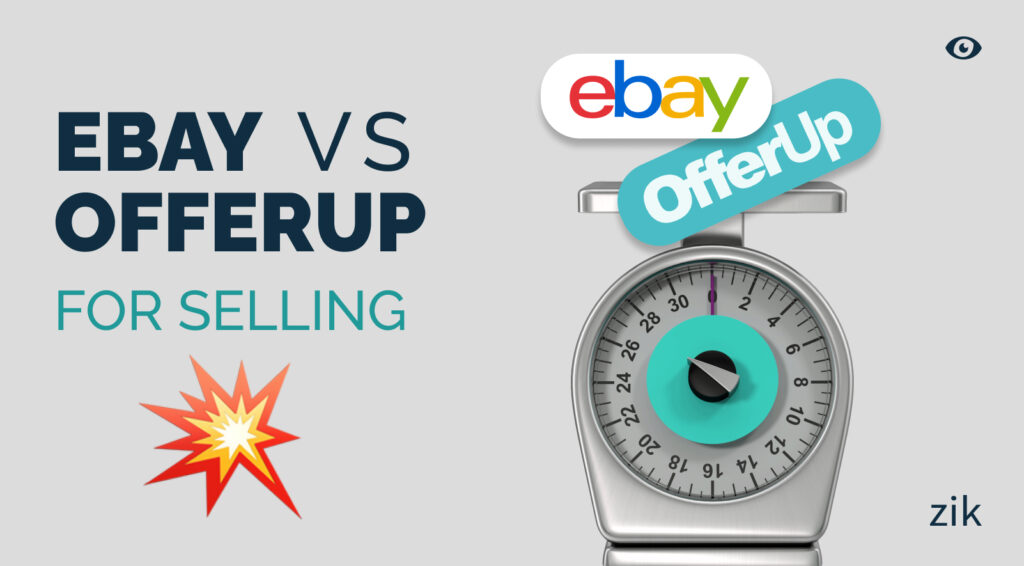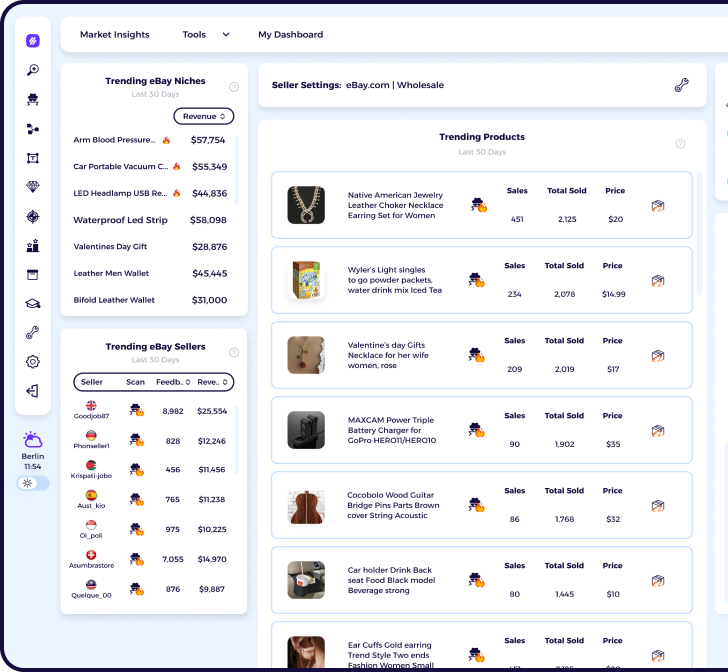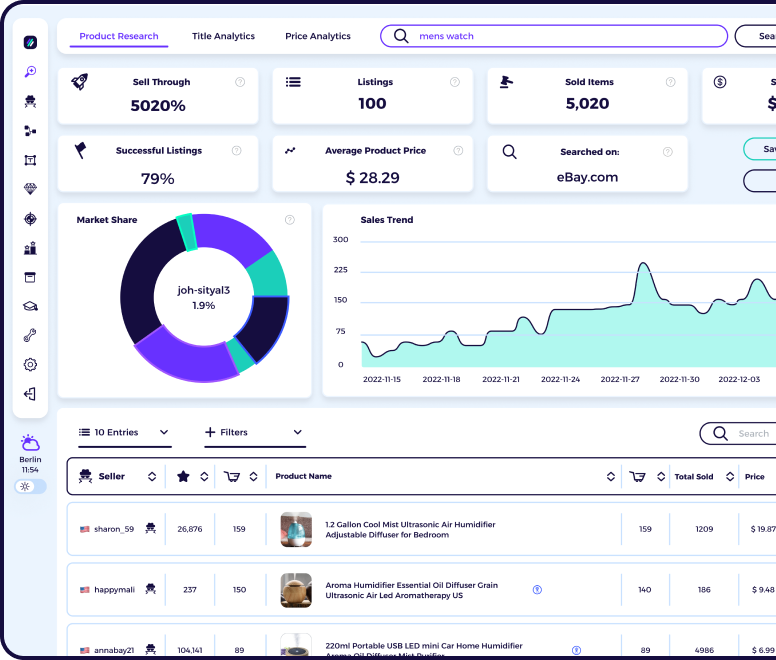If you’re looking for the best platform for selling online, we’ll dive into Offerup vs eBay to help you pick what’s right for your business.
We’ve done the legwork for you, gathering facts and evaluating the features of each site for aspiring online sellers, and we’ve determined that eBay continues to be the go-to choice as an online selling platform.
However, Offerup makes a good case as an alternative, especially among those who want to overcome the high selling fees on the popular ecommerce platform. Make sure to keep reading toward the end, as there will be a detailed comparison for each platform for selling online.
The Internet age is a prime opportunity for anyone to start an online business. Anyone can sell items from their attics, closet, or garage without setting up a sale sign in their front yard.
Gone are the days of placing big and heavy boxes to the curb, setting up tables, and haggling with neighbors under the summer’s scorching heat to dispose of your treasures.
With just a few clicks of the mouse, you can turn your old yet valuable stuff into cash. Online selling platforms and social media, like Facebook Marketplace, transformed the world into a vast local marketplace.
eBay, for example, is a behemoth in this industry and has been around for decades.
Offerup is a budding platform for selling that looks to rival the giant by offering exciting features.
But which one is better? Which one is right for you? Let’s dive deep into this battle between an established brand and an ambitious newcomer.
Article Overview
eBay And OfferUp: A Quick Overview
OfferUp Is More Than Just A Local Marketplace
eBay And OfferUp: A Quick Overview
Before knowing about the differences between Offerup vs eBay, it’s important to know what these platforms offer their users.
When buying and selling online, eBay has been an institution. Present in over 190 markets and about 135 million users worldwide, it’s the go-to platform for many buyers and sellers. In the past couple of years, however, other sellers like OfferUp have started to take away some of the market share by offering a local community.
OfferUp is specifically designed to resemble a virtual garage sale for the local community. With a simple and user-friendly interface, anyone, even newbie buyers and sellers on the platform, can get into the game without fuss.
How They Work
eBay
For Sellers
If you want to sell, create an eBay account through their website. From there, list the items in most categories entirely for free (up to a certain limit).
The process to sell items is pretty straightforward: snap and upload photos of your items, write a short description, set the price, and you’re good to go. Your item will be available for potential buyers around the web.

For Buyers
For buyers, create an account and enter your details, such as delivery address, shipping details, email, and mobile number. Then, add your payment option or card details to your account. After setting up your account, you can then start shopping. Once you have your desired items, choose your preferred payment method, and that’s it.
eBay Pros and Cons
Pros
- Shop with top brands, low prices, and even free shipping
- Global market, great for brands and small businesses to sell products anywhere in the world
- With a built-in tracking app to help you track your orders
- They often offer special deals and discounts, especially on clothes
- Easy return and refund policy
Cons
- After growing their store, sellers will be charged to list their items
OfferUp

For sellers
OfferUp’s selling process is pretty similar, except that the platform is mainly for people looking to sell items locally. Would-be sellers can create accounts either through the website or through the app.
Then, upload the images of your items, set the price and shipping cost (or if you want to cover the delivery for the item), and write a short description. From there, you can set the category and then list the item. The platform has its own built-in messenger for buyers to contact the sellers.
The best thing is that the listing is for free. Payment option is available for cash on delivery and via PayPal.
For Buyers
Buying items from OfferUp is also easy. Again, create and log in to your account through the website or the app. You can even use your Facebook account to make an OfferUp account. From there, you can choose categories or use the search bar to look for the specific item you want.
You can use their built-in messenger to talk to the seller. After agreeing to the price and details of your product, you can then select the time, data, and location for your delivery. Once you have that figured out, you can choose the payment options (cash on delivery, via PayPal, etc.)
OfferUp Pros and Cons
Pros
- 100% safe
- Full-fledged and comprehensive app for easy buying and selling
- With a rewards system that lets you accumulate points when selling more
- No listing fee
- Offers infinite items listed on their app
- Built-in and supported by PayPal
Cons
- You will have to pay extra to ship the product
- Limited boundaries, location-based selling platform
OfferUp Is More Than Just A Local Marketplace
It is easy to see that OfferUp’s biggest advantage over eBay is its focus as a marketplace for local communities. It is comparable to Facebook Marketplace, which focuses on the local community. Their app now offers a shipping feature which allows the brand to expand its horizon in attracting potential customers.
Aiming to attract more people and rival the established online selling platforms, OfferUp offers a local pickup spot for buyers and sellers.
Online buyers who prefer the “Ship to me” feature can now access goods for shipping. While buying and selling remain the main focus of OfferUp, shipping indeed brings in another convenient feature for both buyers and sellers.
There will be additional delivery charges for sellers who opt to ship the products. For buyers, shipping cost depends on the size and weight of the item, which ranges from $5 to $20 for USPS delivery.
Another great thing about OfferUp is that it seamlessly integrates with Facebook, which means users can easily buy and/or sell within their networks in nearby locations.

Fee Structure
This is often the deciding factor for startups and small businesses, which is understandable as nobody wants to be bogged down with fees.
While eBay offers free listing up to a certain number, they charge sellers once they reach a certain number of sales. Often, these charges are based on the categories of the items.
OfferUp has no fees. However, shipping fees can add up.
Ads and Promotions
Listing your item is one thing; getting more people to see your offer is another.
When it comes to eBay, their vast reach can definitely help your items get more attention. Plus, they provide sponsored listings, too, should you want to push your items to the top of the search results. Obviously, this comes with a cost.
OfferUp, on the other hand, offers free listings. They have promotional options, too, which will let you list your items in search results.
Payment Options and Security
As more and more people opt for online platforms to buy and sell, security becomes paramount. Whether it’s the seller ensuring they get paid for sending out the item or the buyer making sure they get what they paid for, understanding the options for payment and how the platform safeguards the process is crucial.
Having been in the industry for decades, eBay has streamlined its payment processes. It has primarily partnered with PayPal for secured transactions (for buyers and sellers). This also means most item categories have safeguards in case things go south.
OfferUp has two main payment options: buyers can pay in cash upon local pickup or choose PayPal for shipped items. This flexibility provides convenience and peace of mind for people who prefer either process.
OfferUp vs eBay: Which One Should You Use?
Both have their own share of pros and cons, plus determining which is “best” for you depends on exactly what you are looking for and what you want to get.
If you want to sell or resale items locally, then the local marketplace setup of OfferUp makes more sense. This platform emphasizes local communities to ensure you can sell your items without worrying about shipping costs.
If you want to sell overseas, eBay is the go-to platform. It’s an established name, and its vast reach is hard to beat. This is also an excellent option if you want to grow your business, expand your brand and sell products globally.
For cost and fees, OfferUp takes the edge over eBay, especially for sellers still starting out in the industry and don’t want to pay any fees.
OfferUp’s journey is no different to other startups. They started and built their reputation in local communities.
Now, they are looking to compete against eBay. The addition of their shipping feature shows their desire to reach more people, helping more businesses expand their reach.
Offerup vs eBay: Final Thoughts on Selling
Offerup vs eBay is an easy choice for anyone aspiring to run a thriving online business. eBay’s online footprint is extremely extensive. This global marketplace is where businesses have grown from ideas to recognized brands.
But with OfferUp offering more affordable fees (eBay charges add up when you start to sell more items), it will not be surprising to see more buyers and sellers shifting to their selling platform.
Whichever you choose, you cannot go wrong with either of them. You can even use both to maximize the visibility of what you’re selling. Of course, it goes without saying that you should manage your listings across platforms to avoid selling the same item twice.
Want to compare other marketplaces? Check out these handy guides
Amazon vs Shopify
eBay vs Etsy
eBay vs Amazon
eBay vs Mercari
eBay vs Whatnot
eBay vs Offerup






